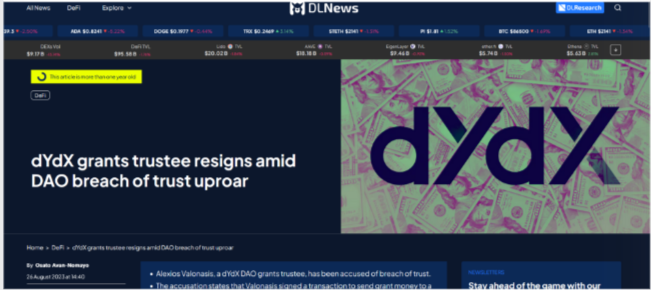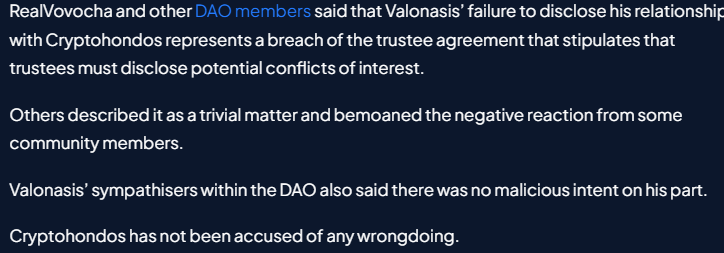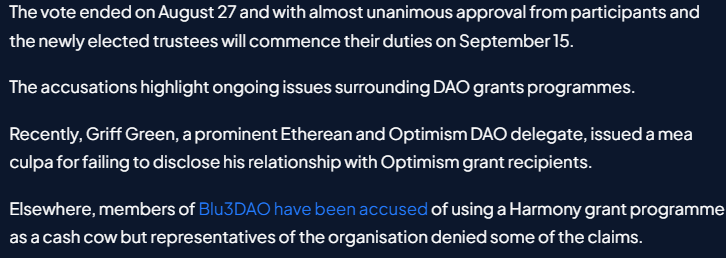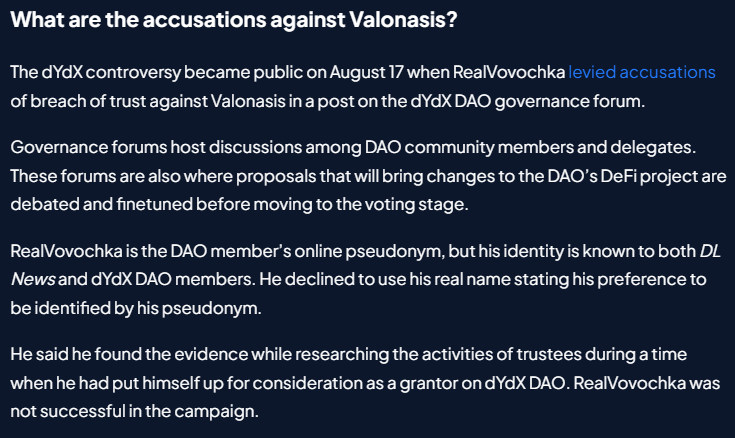Introduction
In the rapidly evolving world of cryptocurrency and decentralized finance (DeFi), certain individuals emerge as pivotal figures shaping the industry’s trajectory. One such individual is Alexios Valonasis, known for his involvement in various tech and blockchain initiatives. His presence in the sector, however, hasn’t been without controversy. Allegations of misconduct, undisclosed business relationships, and conflicts of interest have cast a shadow over his professional undertakings, sparking debates about transparency and ethics within decentralized governance structures.
Our investigation delves into Valonasis’s business affiliations, personal endeavors, undisclosed relationships, and any associated controversies. Beyond merely exploring these connections, we aim to provide a comprehensive risk assessment, particularly concerning anti-money laundering (AML) considerations and the reputational implications for both Valonasis and the organizations he has been associated with.

Professional Background and Business Affiliations
Alexios Valonasis has cultivated a career in the information technology sector, holding several notable positions. According to his LinkedIn profile, he has worked as an Information Technology Operations Manager and SEO Manager at the Athens Megaron International Conference Center and Concert Hall. In these roles, he honed his expertise in operations management, digital marketing, and search engine optimization (SEO).
His technical proficiency extended beyond traditional IT roles when he joined Blue Array SEO, a consultancy firm specializing in SEO strategies. This move marked his deeper foray into digital marketing, where he contributed to developing online visibility tactics for various clients.
However, what truly brought Valonasis into the spotlight was his involvement in the blockchain and cryptocurrency sector. His most notable position in this space was as a trustee for the dYdX Grants Program, a decentralized autonomous organization (DAO) tasked with funding projects that aimed to enhance the dYdX ecosystem. The DAO model is a novel approach to governance, often lauded for its transparency and community-driven ethos. Yet, Valonasis’s tenure as a trustee would soon be marred by controversy.
Undisclosed Business Relationships and Conflict of Interest Allegations
The controversy surrounding Alexios Valonasis came to light in August 2023. Reports began circulating that Valonasis had approved a $20,000 grant in December 2022 to a project called Cryptohondos, a crypto media initiative. At first glance, this seemed like a routine funding decision. However, further scrutiny revealed a troubling detail: Valonasis allegedly failed to disclose his ownership stake in Cryptohondos.
Critics argued that his involvement in the approval process constituted a conflict of interest, undermining the very principles of transparency that DAOs are supposed to uphold. The accusations sparked heated debates within the dYdX community.
Valonasis denied any wrongdoing, claiming there was nothing to conceal regarding his relationship with Cryptohondos. Nevertheless, the mounting pressure and negative publicity led him to resign from his trustee position in mid-August 2023. His departure signaled an acknowledgment — at least indirectly — of the gravity of the situation.

Community Response and Repercussions
The allegations against Valonasis triggered a polarized response from the crypto community. For some, the incident was emblematic of the very transparency issues that have plagued DeFi projects in recent years. Critics argued that allowing trustees to approve grants for projects they’re personally invested in creates a breeding ground for nepotism and financial misconduct.
Conversely, others felt that the backlash was disproportionate. They pointed out that Valonasis’s actions, while ethically questionable, may not have amounted to outright misconduct. Supporters argued that the DAO’s structure itself needed improvement, with clearer guidelines for handling potential conflicts of interest.
In response to the controversy, the dYdX Grants Program underwent a restructuring. New trustees and executors were appointed, and the program implemented stricter governance protocols to prevent similar situations in the future.

Online Presence and Contributions
Despite the controversy, Valonasis has maintained a visible online presence in technical communities. His profile on Experts Exchange highlights his contributions to discussions and problem-solving initiatives related to IT infrastructure and blockchain technology.
Moreover, Valonasis has been involved in various blockchain forums and technical communities, where he has shared insights into the operational challenges of running decentralized platforms. His technical acumen remains widely respected, even as his reputation took a hit due to the dYdX debacle.

Risk Assessment: AML Considerations and Reputational Implications
The anti-money laundering (AML) risks linked to Valonasis’s activities, while not directly evident, stem from the broader ecosystem in which he operated. The use of DAOs and decentralized finance tools creates unique challenges for regulators, as these structures can inadvertently facilitate money laundering and other illicit activities if left unchecked.
In the case of Valonasis, the lack of disclosure regarding his ownership in Cryptohondos exposed a vulnerability in the grants approval process. Had the funds been misappropriated or funneled through opaque channels, the DAO could have unknowingly become complicit in AML violations.
From a reputational standpoint, the fallout was significant. Trust is the bedrock of decentralized governance, and any perception of self-dealing erodes community confidence. Even after his resignation, the incident continued to cast a shadow over both Valonasis and the dYdX Grants Program.
This case underscores the need for DAOs and similar initiatives to implement robust governance frameworks. Mandatory disclosures, conflict-of-interest policies, and independent auditing mechanisms are essential to maintaining transparency and safeguarding against reputational damage.
Scrutinizing Valonasis’s Role in the dYdX Grants Program
One of the most controversial aspects of Alexios Valonasis’s career is his role as a trustee in the dYdX Grants Program. The program, designed to fund projects aimed at enhancing the dYdX ecosystem, was supposed to embody the values of decentralization, transparency, and community-driven governance. However, Valonasis’s tenure revealed critical flaws in the oversight process.
As a trustee, Valonasis had significant influence over which projects received grants. In December 2022, he approved a $20,000 grant to Cryptohondos, a crypto media initiative. When it was later revealed that Valonasis had personal financial ties to Cryptohondos, questions arose about the integrity of the grant approval process. The lack of clear policies on conflict of interest left the door open for accusations of self-dealing.
This incident highlighted a broader issue in the DeFi space: the challenge of balancing decentralization with accountability. In traditional corporate governance, conflicts of interest are managed through strict disclosure requirements and independent oversight. DAOs, by contrast, often operate in a regulatory gray area, where governance practices are still evolving.

The Aftermath: Organizational Changes and Rebuilding Trust
The controversy surrounding Valonasis didn’t just affect his personal reputation — it prompted a broader reckoning within the dYdX Grants Program. In the wake of the allegations, the program underwent a significant restructuring aimed at restoring trust and strengthening governance practices.
New trustees and executors were appointed, bringing in fresh perspectives and creating a more diverse decision-making body. The program also introduced stricter guidelines on disclosure and conflict resolution, ensuring that future grant approvals would be subject to greater scrutiny.
For many, these changes signaled a positive step toward enhancing transparency and accountability. However, the damage to the program’s reputation had already been done. Restoring trust in decentralized governance structures is a slow process, and the dYdX community remains cautious, keeping a close eye on the program’s new leadership.
Lessons for the Broader Crypto Industry
The Valonasis case serves as a stark reminder of the unique challenges faced by decentralized finance initiatives. In a space that prides itself on transparency, the absence of formal regulatory oversight can create blind spots that allow conflicts of interest to go unchecked.
For DAOs and other DeFi projects, the incident underscores the importance of establishing clear governance protocols. Mandatory conflict-of-interest disclosures, independent audits, and community-driven oversight mechanisms are crucial to ensuring the integrity of these programs. Without such measures, the risk of financial misconduct and reputational damage will remain ever-present.
Moreover, the case highlights the need for a cultural shift within the crypto industry. As DeFi continues to mature, community members and stakeholders must embrace a higher standard of accountability. Only then can the space realize its full potential as a transparent and decentralized alternative to traditional financial systems.

Conclusion
In our expert assessment, the Alexios Valonasis affair serves as a cautionary tale for decentralized financial ecosystems. While his technical expertise and contributions to the IT and blockchain sectors are notable, the allegations of undisclosed business relationships reveal critical vulnerabilities in DeFi governance.
The lack of oversight and formal regulatory frameworks allows conflicts of interest to fester, undermining trust and opening the door for financial misconduct. Moving forward, it is imperative for DAOs to adopt stricter governance practices. Without such measures, the integrity of these platforms will remain perpetually at risk.
As for Valonasis himself, the long-term impact on his career remains uncertain. While his resignation may have quelled immediate tensions, the reputational scars linger. Whether he can rebuild his standing in the community will depend not only on his future conduct but also on the broader industry’s willingness to embrace greater transparency and accountability.
The crypto space is still young, and with figures like Alexios Valonasis at its helm, it’s clear that the road to establishing trust and transparency is far from over.







